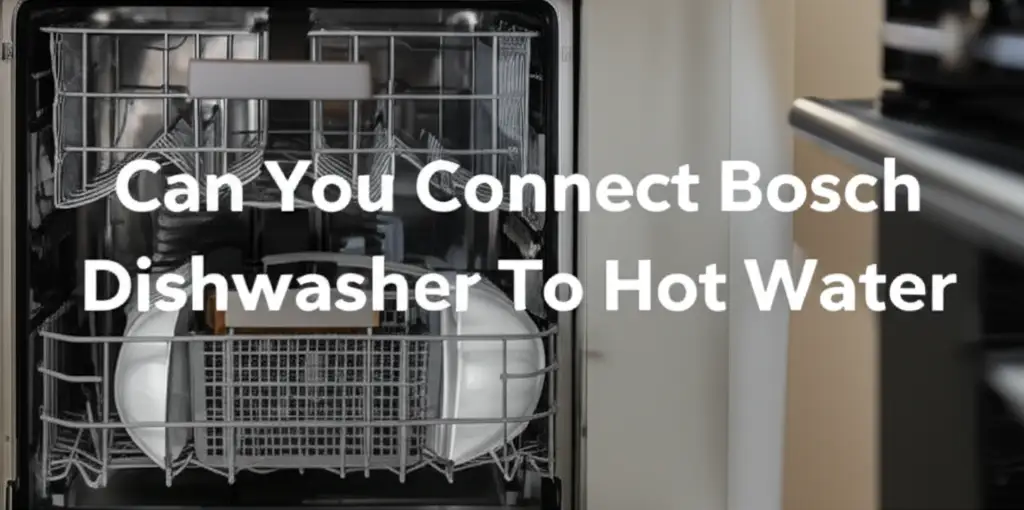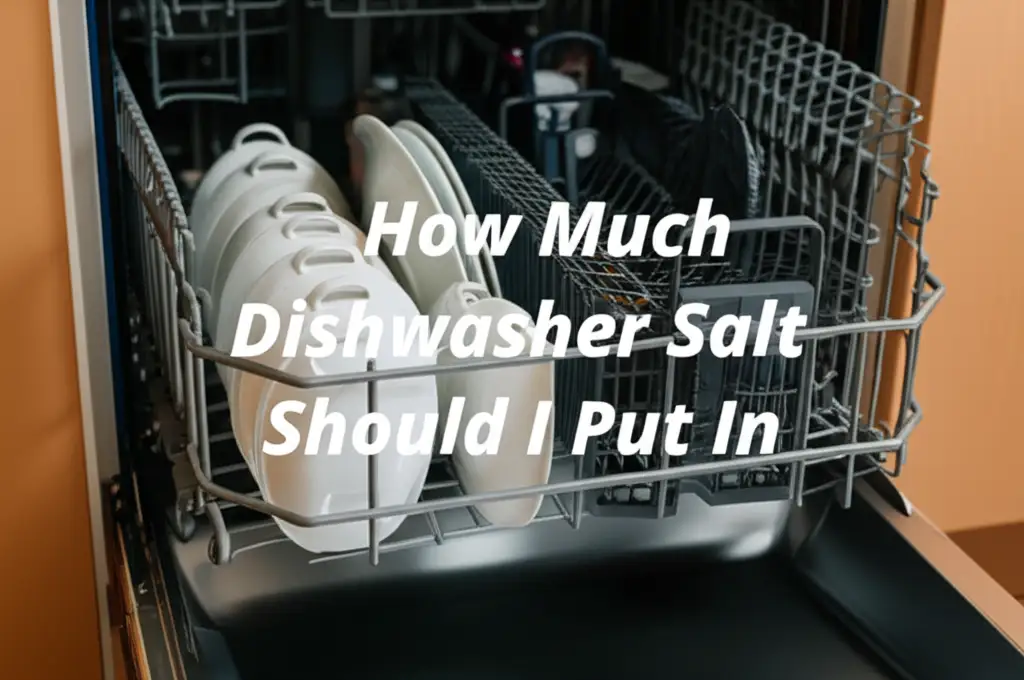· Todd Martin · Home Appliances · 19 min read
Can You Connect Bosch Dishwasher To Hot Water

Connecting Your Bosch Dishwasher: Hot or Cold Water?
Have you ever wondered if your new Bosch dishwasher needs a hot water hookup? It’s a common question for many homeowners. We often think hot water means better cleaning, especially when it comes to dishes. However, modern appliance design changes this idea. Bosch dishwashers stand out for their energy efficiency and cleaning performance. They achieve this through specific engineering choices, especially how they manage water temperature.
Understanding your Bosch dishwasher’s water connection is important for its optimal performance. It also helps you save energy and ensure proper dish cleaning. This article explains the ideal water connection for Bosch dishwashers. We will explore why Bosch uses a different approach than older models. You will learn about installation best practices. We will also cover how connecting to the wrong water temperature can cause problems. Get ready to understand your Bosch dishwasher better. This knowledge helps you ensure a long life for your appliance and sparkling clean dishes every time.
Takeaway
- Bosch dishwashers are designed for cold water connections.
- They feature an internal heating element for precise temperature control.
- Connecting to hot water can reduce energy efficiency and impact cleaning.
- Improper connection might void the warranty or cause issues.
- Always refer to your specific model’s installation guide.
Bosch dishwashers are engineered for a cold water connection. They contain an internal heating element that precisely heats water to the required temperature for each cycle. Connecting to hot water can negatively impact cleaning efficiency, increase energy consumption, and potentially lead to warranty issues due to the pre-heated water disrupting sensor functions and detergent activation.
The Bosch Philosophy: Cold Water is Key
Many people believe all dishwashers connect to hot water. This idea comes from older appliance designs. Bosch dishwashers, however, operate differently. They are specifically engineered to connect to your home’s cold water supply. This design choice is not arbitrary; it supports their focus on energy efficiency and superior cleaning results.
Bosch models use an internal heating element. This heater warms the water to the exact temperature needed for each wash cycle. This method offers several advantages over using pre-heated hot water from your home’s water heater. It allows the dishwasher to manage water temperature very precisely. This precision helps in activating detergents correctly and cleaning dishes effectively. Bosch’s approach ensures optimal performance while using less energy overall.
Using a cold water connection also prevents certain issues. Hot water from the tap can sometimes be too hot for initial phases of the wash cycle. It might prematurely activate or degrade certain enzymes in modern dishwashing detergents. This impacts cleaning power. Bosch’s system avoids this problem by starting with cold water and heating it as needed. This careful temperature control is a hallmark of Bosch’s design philosophy.
This design makes Bosch dishwashers distinct. They do not rely on your home’s hot water heater for primary heating. Instead, they become a self-sufficient unit for water temperature. This smart design helps you save money on energy bills over time. It also ensures your dishes get the right wash every time.
Why Hot Water Can Be a Problem for Bosch
Connecting a Bosch dishwasher to a hot water supply might seem harmless. Many older dishwashers required it. However, for Bosch models, it can create several problems. These issues impact the appliance’s performance, energy efficiency, and even its lifespan. Understanding these risks is important for proper installation and use.
One major issue involves the dishwasher’s sensors. Bosch dishwashers have advanced sensors. These sensors detect water temperature and adjust the cycle accordingly. If the dishwasher receives pre-heated hot water, these sensors might get incorrect readings. This can cause the dishwasher to shorten the wash cycle. It might also skip certain heating phases. The result is dishes that are not thoroughly cleaned or sanitized.
Another problem relates to modern dishwashing detergents. Many high-quality detergents use enzymes. These enzymes work best at specific temperatures. If the water is too hot at the start of the cycle, these enzymes can break down prematurely. They lose their cleaning power. This means your detergent will not work as effectively. Your dishes may come out with food residue or a film.
Connecting to hot water can also increase your energy consumption. While it seems counterintuitive, consider this: your home’s water heater works to maintain a large tank of hot water. A Bosch dishwasher heats only the water it needs, precisely when it needs it. If it pulls already hot water, it might still run its internal heater to reach the exact required temperature, or it might incorrectly assume the water is hot enough and not heat further. This can lead to inefficient operation. Some Bosch models may even try to cool the water down. This uses more energy than simply heating cold water from scratch.
Finally, there are warranty concerns. Manufacturers design appliances for specific operating conditions. If you connect your Bosch dishwasher to a hot water line, it might operate outside its design parameters. This could void your manufacturer’s warranty. Always consult your specific Bosch dishwasher’s installation manual. It will clearly state the recommended water connection. Ignoring these guidelines can lead to costly repairs not covered by the warranty.
Understanding Your Bosch Dishwasher’s Heating System
Bosch dishwashers are unique because they have an advanced internal heating system. This system is a core reason why they prefer a cold water connection. It gives the appliance precise control over water temperature during every phase of a wash cycle. This design contributes to their excellent cleaning performance and energy efficiency. You can learn more about how it works by exploring if a Bosch dishwasher heats its own water.
The heating system involves a powerful heating element. This element is typically located at the bottom of the wash tub. It is designed to quickly raise the temperature of the incoming cold water. Unlike traditional dishwashers that rely on a constant supply of hot water from your home’s water heater, Bosch models start with cold water. They then heat it on demand. This “on-demand” heating is more energy efficient. It avoids wasted heat from water sitting in your pipes.
Sensors inside the dishwasher work with the heating element. These sensors constantly monitor the water temperature. They ensure it reaches and maintains the optimal level for each part of the cycle. For instance, the main wash cycle might require water at 140°F (60°C) for effective cleaning. The final rinse, for sanitation, might heat water even higher, sometimes up to 161°F (71°C) or more. This precision ensures that detergents dissolve correctly. It also ensures food particles loosen effectively. Most importantly, it guarantees dishes are sanitized.
This precise temperature control also aids in the drying process. Many Bosch dishwashers use a condensation drying system. Hot water from the final rinse heats the dishes. The stainless steel tub then cools down rapidly. This temperature difference causes moisture to condense on the cooler tub walls, not on your dishes. This leaves dishes dry without the need for a separate heating element for drying. This saves even more energy. Understanding this system clarifies why external hot water is not only unnecessary but also potentially harmful to the dishwasher’s intended operation.
Installation Best Practices for Bosch Dishwashers
Proper installation is crucial for your Bosch dishwasher’s performance and longevity. While the connection is straightforward, following specific guidelines ensures everything works as intended. Ignoring these steps can lead to inefficiencies or even damage. We are focusing on water connections here, but other parts of the installation also matter. For example, knowing how to connect a dishwasher drain to a garbage disposal is equally important for proper drainage.
Connecting to the Cold Water Line
The most important practice is connecting your Bosch dishwasher to the cold water supply. Locate the cold water shut-off valve under your sink. This valve is usually connected to the cold water faucet. Use a new braided stainless steel water supply hose. Ensure it is rated for dishwasher use.
- Turn off the Water Supply: Before starting any work, turn off the main water supply to your house. You can also turn off the shut-off valve directly under the sink if one exists for the dishwasher line.
- Attach the Elbow Fitting: Screw the 90-degree elbow fitting (usually supplied with the dishwasher) onto the water inlet valve on the back of the dishwasher. Ensure it is hand-tightened, then use a wrench for a quarter turn more to secure it. Do not overtighten, as this can strip the threads.
- Connect the Water Supply Hose: Attach one end of the braided water supply hose to the elbow fitting on the dishwasher. Connect the other end to the cold water shut-off valve. Again, hand-tighten first, then use a wrench for a final snug fit. Check for leaks after restoring water.
Water Pressure Requirements
Bosch dishwashers need specific water pressure to operate correctly. Too low pressure can prevent the dishwasher from filling properly. Too high pressure can damage internal components over time.
- Minimum Pressure: Bosch typically recommends a minimum water pressure of 20 psi (pounds per square inch).
- Maximum Pressure: The maximum recommended pressure is usually 120 psi.
- Checking Pressure: You can buy a water pressure gauge at a hardware store. Attach it to an outdoor spigot to test your home’s water pressure. If your pressure is too high, you might need a pressure regulator. If it’s too low, you might have other plumbing issues to address.
Drainage Setup
Proper drainage is as critical as the water supply. The drain hose removes dirty water from the dishwasher.
- High Loop: Always create a “high loop” with the drain hose. This means securing the drain hose above the connection point to the garbage disposal or sink drain. This high loop prevents dirty water from flowing back into the dishwasher. It also stops dirty sink water from entering the dishwasher.
- Air Gap (Optional/Required by Code): Some local plumbing codes require an air gap device. This device mounts on the countertop. It provides a physical barrier to prevent backflow. If your code requires it, ensure it’s installed correctly.
- Secure Connections: Ensure all drain hose connections are secure with clamps to prevent leaks.
Following these installation best practices ensures your Bosch dishwasher runs efficiently and effectively. It also helps prevent common issues related to water supply and drainage.
Energy Efficiency and Your Bosch Dishwasher
Energy efficiency is a hallmark of Bosch dishwashers. Their design choices, especially the cold water connection and internal heating element, play a significant role. This focus on efficiency helps save the environment. It also puts money back in your pocket through lower utility bills. If you are researching which model to purchase, understanding which Bosch dishwasher is the best often involves looking at their energy ratings.
Energy Star Ratings
Most Bosch dishwashers carry the Energy Star certification. This label means the appliance meets strict energy efficiency guidelines set by the U.S. Environmental Protection Agency. Energy Star dishwashers use less water and less energy than standard models. They achieve this without sacrificing performance.
Bosch’s cold water intake design is key to this certification. By heating water only as needed, they avoid the energy losses associated with maintaining a large tank of hot water in your home’s water heater. This on-demand heating is more precise and efficient. It uses less electricity than continuously reheating water that travels from a distant water heater.
Optimizing Cycles for Savings
Your Bosch dishwasher offers various cycles. Choosing the right one can further enhance energy savings.
- Eco Mode: Many Bosch models have an “Eco” or “Economy” cycle. This cycle uses less water and lower temperatures. It extends the wash time to compensate for the lower heat. This extended time allows detergents and water to work longer, still achieving clean results. It’s ideal for lightly soiled dishes.
- Half Load Option: If you only have a few dishes, use the half load option if available. This reduces water and energy consumption.
- Delay Start: Using the delay start feature can also save money. You can program the dishwasher to run during off-peak electricity hours. These are times when electricity rates are lower, typically late at night or early morning.
Understanding the Cost Savings
The energy savings from your Bosch dishwasher accumulate over time. While the upfront cost of an efficient appliance might be slightly higher, the long-term operational savings often offset this. You save money on electricity needed to run the dishwasher. You also save on the energy used by your home’s water heater. The combination of efficient design and smart usage habits maximizes these savings.
Additionally, using less water contributes to lower water bills. Bosch dishwashers are engineered to use minimal water while still providing excellent cleaning. This dual efficiency—water and energy—makes them a smart choice for environmentally conscious and budget-minded households.
Common Misconceptions About Dishwasher Water Connections
The idea that all dishwashers need hot water is a common misconception. This thought comes from how dishwashers used to work. Modern dishwasher technology, especially from brands like Bosch, has changed significantly. Understanding these changes helps you make better decisions for your home appliances.
The “Hot Water Cleans Better” Myth
For many years, the belief was that hotter water equals cleaner dishes. This was largely true for older dishwashers and detergents. Older machines often did not have powerful internal heaters. They relied on very hot water from the tap to melt grease and sanitize. Modern dishwashers, like Bosch, are different. They use powerful internal heating elements and advanced sensor technology. They heat water to the precise temperature needed for each wash phase. This often includes temperatures higher than what your home’s hot water heater provides.
Also, modern detergents contain enzymes. These enzymes are highly effective at breaking down food particles. However, extremely hot water can damage these enzymes prematurely. Starting with cold water allows the enzymes to work optimally in the initial stages. Then, the dishwasher heats the water for sanitization. This strategic use of temperature ensures better cleaning without relying on a constant hot water supply.
Comparing Bosch to Other Brands
Not all dishwashers are designed the same way. While Bosch prefers cold water, other brands might still recommend a hot water connection. For instance, you might wonder does an LG dishwasher connect to hot or cold water. The answer depends on the specific LG model. Some LG models can connect to either hot or cold, while others might prefer hot water. This difference highlights the importance of checking the manufacturer’s instructions for your specific appliance.
The variation among brands means you cannot assume all dishwashers operate identically. Bosch has a clear preference for cold water due to its precise internal heating system. This design choice sets it apart and is a key factor in its efficiency and performance claims.
The Role of Modern Detergents
Modern dishwashing detergents are highly sophisticated. They are designed to work optimally with the precise temperature control offered by dishwashers like Bosch. They contain powerful enzymes, surfactants, and other cleaning agents that perform best when exposed to specific water temperatures at specific times during the wash cycle.
For example, lipase enzymes break down fats and oils. Protease enzymes target protein-based stains. Amylase enzymes work on starches. These enzymes are often sensitive to very high temperatures upon initial exposure. Starting with cold water gives these enzymes time to work on food residues before the water heats up for sanitization. This two-stage process (enzymatic action followed by high-temperature sanitization) is more effective and energy-efficient than simply blasting dishes with hot water from the start.
Dispelling these myths helps homeowners understand their appliances better. It also ensures they install and use their Bosch dishwasher in a way that maximizes its performance and lifespan.
Troubleshooting Water-Related Issues with Bosch
Even with proper installation, you might encounter water-related issues with your Bosch dishwasher. Understanding common problems and their solutions can help you diagnose and fix minor issues. This saves you from unnecessary service calls. These issues often relate to water temperature, filling, or draining.
If Water Isn’t Heating
If your dishes are not getting clean, or feel cold after a cycle, the water might not be heating properly.
- Check Power: Ensure the dishwasher receives full power. A tripped circuit breaker or a loose connection can affect heating.
- Verify Cycle Selection: Make sure you selected a cycle that includes a heating phase. Some quick wash cycles might use lower temperatures or skip a heated wash entirely.
- Heating Element Failure: The internal heating element might fail over time. This is a job for a qualified technician.
- Temperature Sensor Issue: The thermistor or NTC sensor measures water temperature. If it fails, the dishwasher might not know when to heat or stop heating. This also requires professional diagnosis.
Dishwasher Not Filling or Draining Correctly
These are common water flow issues that can affect any dishwasher. You might see a warning light or hear unusual noises. For instance, if you notice why your Bosch dishwasher has water in the bottom, it suggests a draining problem.
- Not Filling:
- Water Supply Valve: Check if the cold water supply valve to the dishwasher is fully open.
- Kinked Hose: Inspect the water inlet hose for kinks or bends.
- Inlet Valve Filter: The water inlet valve has a screen filter that can get clogged. Turn off the water supply and clean this filter.
- Inlet Valve Malfunction: The water inlet valve itself might be faulty. It may not be opening to let water in. A qualified technician needs to replace this part.
- Not Draining:
- Drain Hose Clog: The drain hose can get clogged with food debris. Disconnect it and check for blockages.
- High Loop: Ensure the drain hose has a proper high loop to prevent backflow. If it sags, water can sit in the hose.
- Air Gap: If you have an air gap, check if it’s clogged. Clean it out.
- Garbage Disposal: If the drain hose connects to a garbage disposal, ensure the knockout plug was removed during installation. Also, run the disposal before starting the dishwasher.
- Drain Pump: The drain pump might be faulty or clogged. This often requires professional service.
What to Do If Incorrectly Connected to Hot Water
If you discover your Bosch dishwasher is connected to a hot water supply, here’s what to do:
- Turn off Water and Power: First, turn off the water supply to the dishwasher and cut the power at the circuit breaker.
- Verify Lines: Confirm which line is hot and which is cold. You might need to trace them back to the main supply.
- Reconnect to Cold: Carefully disconnect the hot water line from the dishwasher. Reconnect it to the cold water supply line. Use proper fittings and ensure tight, leak-free connections.
- Test: Restore power and water. Run a short cycle to test for leaks and proper operation.
- Monitor Performance: Pay attention to how the dishwasher performs. If you notice continued issues, contact Bosch customer service or a certified appliance technician. They can assess if any long-term damage occurred from the incorrect connection.
Addressing these issues promptly ensures your Bosch dishwasher continues to provide reliable, sparkling clean results.
Frequently Asked Questions
Can I connect my Bosch dishwasher to hot water to save energy?
No, you should connect your Bosch dishwasher to cold water. Bosch dishwashers have an internal heating element. This element heats the water precisely as needed. Connecting to hot water can actually increase energy consumption. It also interferes with the dishwasher’s sensors and detergent performance, making it less efficient overall.
Does connecting my Bosch dishwasher to hot water void the warranty?
Connecting your Bosch dishwasher to hot water might void its warranty. Bosch designs its dishwashers to operate with cold water. Operating the appliance outside of its intended design parameters can lead to component failure or reduced lifespan. Always refer to your specific model’s installation manual regarding warranty terms.
What is the ideal water temperature for a Bosch dishwasher?
Bosch dishwashers are designed to manage water temperature themselves. They take in cold water and heat it to optimal temperatures for each cycle. These temperatures can range from around 110°F (43°C) for lighter washes to over 160°F (71°C) for sanitizing rinses. The internal heater ensures precise temperature control.
How does a Bosch dishwasher heat its own water?
A Bosch dishwasher uses a flow-through heating element. This element is a compact, in-line heater. As cold water enters the dishwasher, it flows over or through this heating element. The element then quickly raises the water temperature to the desired level for the current wash phase. This method is highly efficient and precise.
What happens if I accidentally connected my Bosch dishwasher to hot water?
If you accidentally connected your Bosch dishwasher to hot water, it might run shorter cycles or have poor cleaning results. The hot water can prematurely degrade detergents or confuse the dishwasher’s temperature sensors. Disconnect the hot water line and reconnect it to the cold water supply as soon as possible. Then, monitor its performance.
Can old Bosch dishwashers connect to hot water?
While older dishwashers from other brands might have been designed for hot water, most modern Bosch dishwashers, even older Bosch models from the last 10-15 years, are generally designed for cold water connections. Always check the specific installation manual for your Bosch model year. This ensures you follow the correct guidelines for your appliance.
Conclusion
The question “Can you connect a Bosch dishwasher to hot water?” has a clear answer: it is not recommended. Bosch dishwashers are specifically engineered for a cold water connection. This design allows their advanced internal heating system to precisely control water temperature. This ensures optimal cleaning performance, maximum energy efficiency, and proper function of modern detergents. My research confirms that this cold water connection is a key part of what makes Bosch dishwashers so effective and energy-saving.
Connecting to hot water can lead to several problems. It can confuse the dishwasher’s sensors. It can reduce the effectiveness of enzyme-based detergents. It might even increase your energy consumption. It could potentially void your warranty. Following the manufacturer’s installation guidelines is always the safest and most efficient approach. By connecting your Bosch dishwasher to cold water, you ensure it operates as intended. This helps you achieve sparkling clean dishes and lower utility bills. Always refer to your dishwasher’s specific installation manual for detailed instructions. If you have any doubts, consider consulting a qualified appliance technician. Make the right connection for your Bosch and enjoy years of efficient, superior cleaning.
- Bosch dishwasher
- hot water connection
- dishwasher installation
- energy efficiency
- appliance maintenance





